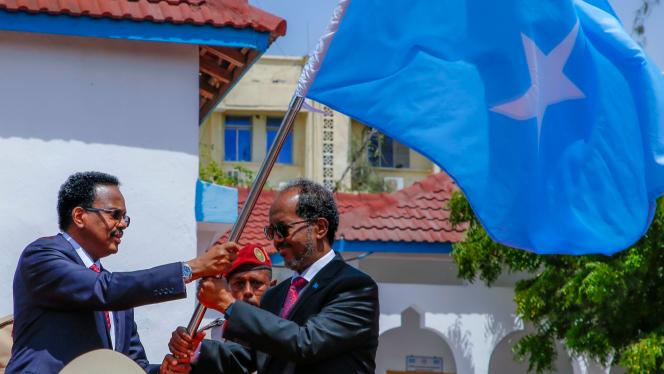Thursday 21 November 2024
Somali nationalism from Mohammed Farmaajo to Hassan Sheikh

Farmaajo stoked Somali nationalist sentiment, but it is under the Hassan Sheikh administration that it turned once more against Ethiopia
When Mohamed Abdullahi Mohamed (Farmaajo) was elected Somalia’s ninth president in 2017, the conclusion of the polls were met with celebratory gunfire in Mogadishu, a welcome change for the city’s inhabitants for whom bullets usually signal a bad omen. Then 55, Farmaajo promised a “new beginning” in Somali politics, with the president-elect telling reporters: “It is the beginning of the war against corruption.” That would be one of the two features which characterised his administration.
The other aspect was a strong surge in Somali nationalism, which, though traditionally fixated on the border dispute with Ethiopia, took a less militaristic expression focussed on non-interference in Somalia’s internal affairs and “returning the dignity of the Somali nation.” You might think of it as Somalia’s answer to Donald Trump’s ‘Make America Great Again.’ It was a novelty which was popular with the Somali public throughout his tenure.
“Whereas prior presidents relied on Islam, clannism or their own networks, Farmaajo is the first president since Siad Barre [Somalia’s late military dictator] to instrumentalise Somali nationalism,” Mohamed Haji Ingiriis, a Somali academic told me when Farmaajo was vying to be re-elected in 2019.
That contrasts sharply with the incumbent Hassan Sheikh Mahmoud, whose greater focus on defeating al-Shabaab has included taking the fight to the militant group on religious grounds, by advancing a form of Somali nationalism with an Islam that acknowledges territorial boundaries, defined against al-Shabaab's transnational ideology. The ‘other’ in Mahmoud’s formulation of Somalinimo wasn’t a different country, but a strain of Islamism articulated by al-Shabaab which doesn’t recognise the Somali state as legitimate.
But as the late British prime minister Harold Macmillan put it, the greatest challenge faced by statesmen are unexpected “events, dear boy, events”. Mahmoud has had to deploy a different brand of Somali nationalism to rally the Somali public in a pushback against Ethiopia on a surprise preliminary agreement it reached with Somaliland, which officials in Hargeisa have said would recognise their secession from Somalia.
Somali politics tends toward turbulence in the best of times, but when Farmaajo held the reigns at Villa Somalia, Trump had just been elected in the United States, the United Kingdom had voted to exit the European Union a year earlier, Turkey had overcome an attempted coup and the Middle East was beginning to fragment between a block led by Iran, an alliance between Turkey and Qatar and the Saudi-Emirati group.
The Horn of Africa was in the midst of its own transformation during that era as pro-democracy protests prompted a coup against long-time leader Omar al-Bashir in 2018 and the TPLF-led EPRDF was facing its own reckoning by the Ethiopian public which would eventually embrace Abiy Ahmed, of Oromo heritage to lead the country.
In one sense Farmaajo was keeping with a trend of bombastic high-stakes politics that had gone global, applying that to his context in Somalia. But how does nationalism work in a state which barely controls its territory? In my meetings with officials from his government, they often felt foreign powers assisting Somalia had excessive influence in the way the country was run and that because of the fragility of the Somali state, they weren’t treated with the respect they deserved.
Mogadishu infamously expelled Nicholas Haysom, the UN top envoy in Somalia, for acting like the country’s “ruler” then foreign minister Ahmed Awad said, and frequently quarrelled with Jubbaland whose president, Ahmed Madobe, was accused by Farmaajo of being too close to Nairobi.
For Farmaajo and the supporters of his Nabad Iyo Nolol administration, the most egregious violator of Somalia’s sovereignty was TPLF-led Ethiopia. When Abiy Ahmed began dismantling its network’s influence in Addis Ababa and eventually declared war on the group in November 2020, Farmaajo had his back to the hilt. He viewed Addis Ababa’s struggle against the Tigrayan party as one he shared with Abiy.
During an address in 2018, Farmaajo likened TPLF influence in Somalia and the Horn of Africa to an overflowing canal causing floods in a garden. Explaining a tripartite pact he agreed with Ethiopia and Eritrea, he told an audience: “In order to stop the flooding, you need to close the canal to protect the garden,” he said.
Neither of them felt they could exercise authority in their countries' as long as the TPLF acted as puppet master in the background. In this version of events Ethiopia wasn’t the problem per se but was a victim of the same dark forces Somalia was. Farmaajo even sacked Ahmed Awad, his foreign minister, because he called for dialogue between the TPLF and the Ethiopian government, when Abiy Ahmed outlined his commitment to reign them in.
In order to mobilise support for his decisions, Ingiriis says, Farmaajo and his ministers often directly communicated with the masses through social media and TV, using fierce nationalist language. “Farmaajo created a government [that] exists in people’s minds, on social media and in the street, not just on paper.”
This even worked when his actions ran contrary to his stated aims, for example, the controversial extradition of Abdikarim Qalbi Dhagah. However, it underlines the point that Farmaajo’s brand of nationalist politics didn’t view Ethiopia as its primary adversary; in stark contrast to the Somali Youth League and Siad Barre’s socialist regime for whom annexing the Ogaden could be likened to the mythic kizil elma (Red Apple) in Turkish political thought or ‘manifest destiny’ in America.
Hassan Sheikh Mahmoud inherited a different set of circumstances and promised a less fiery approach to politics. His campaign slogan was “a people at peace, and a world at peace with them.” Whilst Mahmoud is better known for his sober and measured tone, often avoiding populist rhetoric, his disputes with al-Shabaab and Ethiopia have demonstrated his ability to play hardball.
On al-Shabaab, he vowed to defeat the group during his term, a ruse several Somali presidents have fallen into. Given the conflict is military and ideological, Mahmoud has begun reworking Somali nationalism “through an overtly religious tone” to weaken the poignancy of al-Shabaab’s appeals to faith.
Articulating his view of the type of Somalia he wanted at the Centre for Strategic Studies in September 2022, Mahmoud said: “Somalia belongs to the Muslims, but it belongs to the Somali Muslims, not every Muslim.” Mahmoud later told the Guardian that religion can function as a “glue to bind a fractured nation.” His decision to appoint the controversial former deputy commander of al-Shabaab, Mukhtar Robow, as religious affairs minister is another example of his seriousness on that front.
The memorandum of understanding agreed between Somaliland’s president Muse Bihi and Abiy Ahmed however has put him in a corner. The agreement has been polarising and has infuriated Somalis across all Somali territories, even prompting strong objection from al-Shabaab. Whilst it would have been difficult to imagine Mahmoud don the garb of a 20th century Somali nationalist, it appears he has decided this is a wave he has to ride, or it may engulf him.
During his visit to Italy in late January, Mahmoud likened the Ethiopian pact with Somaliland, to Russian president Vladimir Putin’s invasion of Ukraine, casting his country in the role of a victim powerful neighbour but he has combined that with rhetoric that more directly challenges Ethiopia.
Earlier in January, where he addressed the MoU at a mosque during Friday prayers, Mahmoud raised the taboo issue of Somalia’s long north-south frontier with Ethiopia calling it a “false border.” Clearly raising the spectre of the 1977 invasion of the Ogaden region he said: “it’s not a current issue or case, but that is where it stands, historically.”
Several of his ministers have framed Ethiopia as an adversary, with one adviser telling the Guardian that Mogadishu would be ready for war if Ethiopia persists. Somalia’s deputy prime minister, Salah Jama, blamed Ethiopia’s violent 2006 invasion for the rise of al-Shabaab in an interview with TRT World, despite the assistance Addis Ababa has provided Somalia in its fight with the militant group. The interim state minister of foreign affairs, Ali Mohamed Omar, went further, telling Al Jazeera Arabic that Ethiopia’s deal posed a greater threat to Somalia’s territorial integrity than al-Shabaab.
The issue even boomeranged on Somaliland, where the defence minister Abdiqabi Ateye, resigned because of the MoU, describing Ethiopia as the “enemy number one” of the Somali people. As the Roman poet, Horace, put it: “It is your concern when your neighbour's wall is on fire.”
Ethiopian officials haven’t helped temper this brand of Somali nationalism by provoking Somalis on their social media accounts with their unsolicited hot takes on Somali history – an Ethiopian ambassador undiplomatically called Somalia a colonial creation before retracting his comment – but its presence in governing circles is new. Whilst analysts are dovish about the prospect of war between Ethiopia and Somalia, the agreement Addis Ababa reached with Hargeisa has mainstreamed questions around Somalia’s relationship with its neighbour that appeared not long ago to have been buried in the turbulent 20th century.









